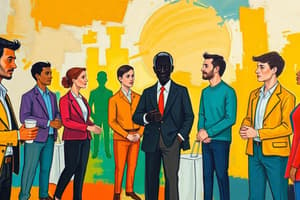Podcast
Questions and Answers
Which of the following best describes the relationship between organizational policies and procedures?
Which of the following best describes the relationship between organizational policies and procedures?
- Policies define _what_ operations need to be done, while procedures outline _how_ these operations are performed. (correct)
- Policies outline _how_ operations are performed, while procedures define _what_ operations need to be done.
- Policies are strategic plans for long-term growth, while procedures are daily operational tasks.
- Policies are externally mandated regulations, while procedures are internal guidelines.
What is the primary goal of a business in the private sector of industry?
What is the primary goal of a business in the private sector of industry?
- To ensure all employees have equal opportunities.
- To make a profit. (correct)
- To provide essential services to the community.
- To adhere strictly to environmental regulations.
What is the main purpose of strategic planning in an organization?
What is the main purpose of strategic planning in an organization?
- To select the organization's goals and the means to achieve them. (correct)
- To manage daily operational tasks.
- To address employee grievances.
- To ensure compliance with legal regulations.
What does 'equal employment opportunity' primarily ensure?
What does 'equal employment opportunity' primarily ensure?
What is the purpose of 'ethical standards' within an organization?
What is the purpose of 'ethical standards' within an organization?
Which statement regarding employee rights is most accurate?
Which statement regarding employee rights is most accurate?
What is a key responsibility of employees?
What is a key responsibility of employees?
Which of the following is a key responsibility of employers regarding workplace environment?
Which of the following is a key responsibility of employers regarding workplace environment?
What is the main benefit of strong workplace compliance?
What is the main benefit of strong workplace compliance?
How do 'roles' and 'responsibilities' relate to an employee's job?
How do 'roles' and 'responsibilities' relate to an employee's job?
What is the primary role of a supervisor in relation to employee performance?
What is the primary role of a supervisor in relation to employee performance?
How does a supervisor contribute to human resource management?
How does a supervisor contribute to human resource management?
What is the critical role of a supervisor in communication?
What is the critical role of a supervisor in communication?
What should a well-prepared supervisor do to promote employee development?
What should a well-prepared supervisor do to promote employee development?
What type of behavior is generally considered unacceptable in the workplace?
What type of behavior is generally considered unacceptable in the workplace?
Your coworker consistently leaves the lights on in a storage room, even though a business policy requires the lights to be turned off to save electricity. What is the most appropriate course of action, assuming the coworker keeps forgetting?
Your coworker consistently leaves the lights on in a storage room, even though a business policy requires the lights to be turned off to save electricity. What is the most appropriate course of action, assuming the coworker keeps forgetting?
What is the essence of workplace cooperation?
What is the essence of workplace cooperation?
What is the guiding principle regarding personal electronic devices that are not work-related?
What is the guiding principle regarding personal electronic devices that are not work-related?
An employee is facing consistent stress due to the demands of balancing work and family responsibilities. According to the text, what is a potential solution an HR department can offer to balance it?
An employee is facing consistent stress due to the demands of balancing work and family responsibilities. According to the text, what is a potential solution an HR department can offer to balance it?
Given the need for organizations to have an environmentally sustainable approach, what would be a recommended approach?
Given the need for organizations to have an environmentally sustainable approach, what would be a recommended approach?
What can prolonged exposure to noise pollution cause?
What can prolonged exposure to noise pollution cause?
An employee comes across a spill of potentially hazardous chemicals in the workplace. What is the most appropriate first step they should take, according to the text?
An employee comes across a spill of potentially hazardous chemicals in the workplace. What is the most appropriate first step they should take, according to the text?
An inventory is conducted and it is determined that there may be a lot of unnecessary paper consumption by employees. How can managers ensure that paper consumption is reduced?
An inventory is conducted and it is determined that there may be a lot of unnecessary paper consumption by employees. How can managers ensure that paper consumption is reduced?
What must employers do to maintain a safe and hazard-free environment?
What must employers do to maintain a safe and hazard-free environment?
An organization aims to improve its environmental practices and resource efficiency. According to this principle, what should an organization do?
An organization aims to improve its environmental practices and resource efficiency. According to this principle, what should an organization do?
What initiative is the most appropriate for those intending to reduce electricity?
What initiative is the most appropriate for those intending to reduce electricity?
Fill in the blank: When analyzing energy trends, it is important to use ________.
Fill in the blank: When analyzing energy trends, it is important to use ________.
An example of the environmental hazards in the workplace is ________.
An example of the environmental hazards in the workplace is ________.
When consulting with your team about improving environmental practices, what is the best way to encourage open communication?
When consulting with your team about improving environmental practices, what is the best way to encourage open communication?
What is the first thing that must occur in order for any change to be implemented?
What is the first thing that must occur in order for any change to be implemented?
What is true about time management?
What is true about time management?
Does this imply one can improve their time management: Time management + Stress management = ________?
Does this imply one can improve their time management: Time management + Stress management = ________?
It is impossible to find a correct dress code and behavior in employees unless _______?
It is impossible to find a correct dress code and behavior in employees unless _______?
What is a code of conduct.
What is a code of conduct.
Which of the following does not relate to work-life balance?
Which of the following does not relate to work-life balance?
What is a common sign of having a 'Hangover' from work in a day?
What is a common sign of having a 'Hangover' from work in a day?
What is the appropriate action to do in workplaces?
What is the appropriate action to do in workplaces?
Which of the following ensures industrial standards?
Which of the following ensures industrial standards?
Fill the blank space: The number of employees ________ is growing considerably.
Fill the blank space: The number of employees ________ is growing considerably.
Flashcards
Organizational Policies
Organizational Policies
Decisions made by management on what operations need to be done, and why.
Organizational Procedures
Organizational Procedures
How operations are performed by the people who have to do them.
Organization's Requirements
Organization's Requirements
Activities that an organization must perform to meet stakeholder needs
Business Requirements Document (BRD)
Business Requirements Document (BRD)
Signup and view all the flashcards
Equal employment opportunity
Equal employment opportunity
Signup and view all the flashcards
Access and equity
Access and equity
Signup and view all the flashcards
Ethical standards
Ethical standards
Signup and view all the flashcards
OHS Procedures
OHS Procedures
Signup and view all the flashcards
Organizational Responsibilities
Organizational Responsibilities
Signup and view all the flashcards
Colleague
Colleague
Signup and view all the flashcards
Coworkers
Coworkers
Signup and view all the flashcards
Supervisor responsibilities
Supervisor responsibilities
Signup and view all the flashcards
Unacceptable behavior
Unacceptable behavior
Signup and view all the flashcards
Workplace cooperation
Workplace cooperation
Signup and view all the flashcards
Work-life balance
Work-life balance
Signup and view all the flashcards
Personal priorities
Personal priorities
Signup and view all the flashcards
Work Life priorities
Work Life priorities
Signup and view all the flashcards
Prioritizing work
Prioritizing work
Signup and view all the flashcards
Identify Your Goals
Identify Your Goals
Signup and view all the flashcards
Resource Efficiency
Resource Efficiency
Signup and view all the flashcards
Environmental performance
Environmental performance
Signup and view all the flashcards
Compliance
Compliance
Signup and view all the flashcards
Environmental Reporting Breach
Environmental Reporting Breach
Signup and view all the flashcards
Safe work practices
Safe work practices
Signup and view all the flashcards
Work Zone
Work Zone
Signup and view all the flashcards
Study Notes
- This study material is for Human Resource Management Level-II.
- The module focuses on developing employee participation and has a nominal duration of 90 hours.
- It is based on the March 2022 Curriculum Version 1, prepared by the Ministry of Labor and Skill, Debre Birhan, Ethiopia.
Key Acronyms
- BRD stands for Business Requirements Document.
- CEO means Chief Executive Officer.
- HR refers to Human Recourse.
- OHS is Occupational Health and Safety.
- MSDS means Materials Safety Data Sheets.
- SWOT stands for Strengthen, Weakness, Opportunity, and Threat.
- WHS refers to Workplace Health and Safety.
Introduction to the Module
- Human resource contributions are vital in modern organizations.
- Improving work habits, identifying resource use, and adhering to environmental regulations are key.
- This module aims to meet human resource industry requirements and focuses on developing employee participation.
- Work within organizational requirements.
- Develop effective work habits.
- Identify current resource use.
- Act with environmental regulations.
- Seek opportunities to improve resource efficiency.
- Module trainees should read information, complete self-checks, and refer to identified reference books.
Work Within Organizational Requirements
- Identifying requirements/responsibilities, understanding employee/employer rights, and identifying standards are important.
- Applying organizational requirements, understanding employee rights, and identifying workplace behavior are important.
Organization's Requirements and Responsibilities
- Organization's requirements are critical activities to meet stakeholder needs, documented in a Business Requirements Document (BRD).
- Organizational policies are decisions by management on operations for fulfilling business goals.
- Organizational procedures explain how operations are performed.
- Having well-planned procedures leads to simplicity, minimum supervision, specialist staff utilization, and less duplication, reducing paperwork and improving quality.
- An organization's prime function is the purpose for which it is in business like manufacturing goods to achieve profit for business owners.
- Effective organizations need clear goals for all personnel, objectives derived from goals, and established staff who follow organizational values.
- Business and performance plans are used for setting goals and objectives.
- Strategic planning is the process of selecting organizational goals through determining necessary policies and methods.
- Managers establish goals, define the present situation, identify aids/barriers, and develop action plans.
- Enterprise agreements outline terms and conditions for employees.
- Equal employment opportunity ensures fair treatment in employment decisions.
- Anti-discrimination and ethical standards are essential.
- Access/Equity ensures social justice and fairness, addressing disadvantages.
- OHS (Occupational health and safety) betters workplace health, studies risks, and suggests mitigations.
- Employment agreements are employment contracts, detailing work conditions which are negotiable.
- Industrial awards grant wage earners minimum pay rates and conditions.
Organizational Responsibilities
- Organizations must implement their organizational responsibilities with balanced approach to run efficiently.
- Any organization represents rationally ordered instruments for achieving its goals.
Employee and Employer Rights and Responsibilities
- According to the Federal Industrial Relations Commission, both parties have rights and responsibilities.
- Employee rights include fair wages, union membership, sick leave, and a safe, discrimination-free work environment
- Employee responsibilities include treating coworkers equally, ensuring reasonable care, reporting hazards, being punctual, obeying instructions, and respecting confidentiality.
- Employer rights include dismissing workers as per the Workplace Relations Act and expecting loyalty.
- Employer responsibilities include providing a safe workplace, preventing discrimination/harassment, insurance, risk management and safety equipment.
Complying Responsibilities, Goals, and Objectives
- An understanding of goals and objectives will help ensure effective job performance.
- Goals and objectives need to be clearly written, communicated, and adhered to.
- A strong workplace compliance program prevents unethical actions and encourages reporting.
Identifying Roles of Colleagues and Supervisors
- Roles refer to a position, whereas responsibilities are tasks related to the job description.
- Colleagues generally means people sharing goals, but it also generally means those work together.
- Coworkers are the people who work for the same company.
- Examples of a customer service positions, communications, responding to customers and handling questions
Roles of supervisors
- One core responsibility is monitoring employee performance.
- The supervisor must train her employess and handle the team making sure they stay on time.
- Supervisors must plan organizing and help a manager make sure a project goes the way it is supposed to go.
- It is important that a supervisor makes sure the human resources function can be used so employees are performing their work.
- A supervisor must ensure a team is working best that it can and working well with the employee.
- Establishing communication is an important element so that people can relay the message to the employess.
- Helping to ensure employees can complete their work adequately for facilities means people can feel comfortable in the work environment.
- Make sure and give employees that resources are made available.
- Supervisors must look at the performance of employeees and provide a report.
- A supervisor is responsible to help ensure there is proper discipline.
- All supervisors help to provide moral support and have empathy.
- A supervisor must have optimum utilization of the resources in order to oversee any waste or lost productivity.
- A supervisor needs to see there are no conflicts and they help them better as people continue to impact a project and work better together.
- Any workplace the most efficient way depends on understanding each role and the duties it carries.
Standards and Values
- Standards by top management as well as strategic plans should be in place
- Bullying, harassment, discrimination are unacceptable behaviours .
- Criticism and jokes, advances, threating a person, foul language, physical contact are all unacceptable.
Safe Work
- When a person is not following safety guidelines it is important there are consequences for not doing so.
- When things are a problem it needs to be spoken about to ensure that it is dealt with safely
- Cooperating with those in your supervisors make sure people are safe in the workplace while working with the parameters of the organization.
- Working as a team member, discussing as people work to solve it.
- Etiquette is incredibly important to make sure everyone feels heard.
Effective Work Habits
- Effective work habits are when you are understanding needs of your job is important.
- Having a balance is important to understand.
Balancing Priorities
- The idea that a fulfilling life outside of work will help to reduce stress.
- A priority is the major and most concerning need to perform an activity with the most effort.
- The 7 Priorities are mission in life, health, family, relationships, mental capacity, finances and self improvement are all very important
Work-Life Priorities
- Prioritization skills and time management.
- Being able to use long term goals and missions to fulfill the urgent needs is very important.
- Publishing, reaching customers and creating programs are important and efficient.
- These seven steps will help to prioritize:
- Identifying goals will give you the bigger picture in time.
- Make a list of the tasks need to complete.
- It is important to assess the amount of work and urgency that must be completed.
- Consider what brings value so that you can allocate the best course of action.
- If efforts are seemingly tied give time allocations to prioritize which task will be most essential to the operations in question.
- Being open to changes can have challenges and that means priorities can shift.
- It is important that there is a structure so to meet important deadlines.
Balance Work-Life Priorities
- Work-life are all priorities to help someone balance their work and personal life.
- Employees can learn if the work-life is balanced it can face situations of stress, physical stress, relational issues and a disconnect from time.
- HR can help with flexi time, more empathetic environment, they can help create that perfect space.
Time Management and Strategy
- A goal to make sure that there is the most potential to get the most done in a day .
- Learning to say now, working and working strategies that can help you do more.
- Being effective means understanding the skills needed in the company along with understanding effectiveness.
Appropriate Dress and Conduct
- Conduct explains a way to understand the proper rules an individuals should follow.
- There needs to some understanding of dress and behavior codes depending on the nature of the position.
Resource use
- By focusing on these things it is essential to a company's productivity.
- Understanding your environmental and resource proficiency can help with maximizing efficiency.
- Ways a business can improve is by being compliant and minimizing the environmental footprint.
- Some waste should work with material water and waste, and saving resources can lead to a reduction in emissions.
Ways to save energy
- Turning off lights and using equipment and Skylights the building.
- You can also save water by installing rainwater tanks and fixing leaky pipes and being conscious of using water otherwise.
- The right products are designed and used so there is less wastage in operations.
- It also looks at how the procedures depend on the materials.
- A waste reduction cycle helps the environment by looking at reducing, reusing, recycling, and replacing items.
So Much of What We Do
- Its impact that it is unrealistic and being aware can help so things can get reduced and bettered.
- It is important to look and assess yourself by understanding the scope and conducting the resources.
- Resources are the essential piece for materials and energy that go into producing and affecting product.
Documenting and Measuring Current Resources
- Template it helps in making quicker choices to understand your always working with the right pieces of data .
- When data is requisitioned look for the suppliers pieces and those who is the most paper.
- Need to better understand using assessing using current usage so that you easily compare the water and electricity.
- Asses can be done with a assessment where is necessary to understanding what the work force is doing.
- The next measure is to see how you can physically count the items and asses the work force.
Resource Use
- Data will be useful to help identify and ensure a organization is best using it.
- It is essential to analyze baseline assessment of data.
- Collect and understand the organization for information.
- Analyze industry and look to better understand the business.
- What is data has been done, it should be reviewed every two years for improvement purposes.
File Documentation
- Follow practices and ensure that all processes are streamlined.
- Information is filed with accuracy and will save time because it can be accessed quickly.
Reporting Hazards
- It's because it is important to understand the use can also open any savings in the waste that can accumulate.
- Hazards can be understood as something that can cause harm or harm.
- Environmental hazards can include chemicals fertilizers and other hazards.
- Think about what happens if things go wrong if chemicals leak or spill they will need to be contained.
- Noise pollution can harm or cause tinnitus, air pollution will come be from smoke, and it is important to avoid issues like bronchitis.
- Look out of for asbestos when on materials and work to get them dealt with.
- Report in order ways that all workers can be safe and work to deal with materials.
- You need to report the process, control what you can, it need to be controlled in a safe manner, follow it and it will help you sustain a safe process properly.
Environmental Requirements
- Some aspects of environmental regulations are law regulation, practices guidelines can be superior to help give a better standard.
- Not conforming means you were in breach.
Report breaches
- Environmental reporting reach means where there is failures to make anything known relating to a climate change issue.
- Identify then report any appropriate personnel and they need to be reported for appropriate reasons.
- List the things that affect your report so that they can be avoided.
- Take actions that are preventative.
- Have safe work practices that that prevent from step routines and are outlined in how to get them preformed.
- Some places should set the appropriate polices in effect to stop the attention from being the hand on that task.
Studying That Suits You
Use AI to generate personalized quizzes and flashcards to suit your learning preferences.




